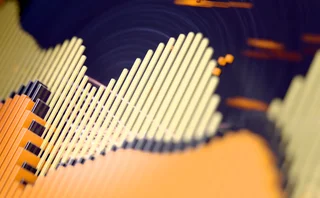Risk Awards 2023: The winners
BNP Paribas takes top derivatives prize, lifetime award for Stephen Kealhofer, Nomura wins rates

After years of US dominance, the spotlight of the Risk Awards shifted to Europe in 2022 – though not necessarily for the best reasons. Surging inflation and Russia’s invasion of Ukraine caused immense volatility, triggering jumbo margin calls and sudden liquidity gaps in derivatives markets.
Many of this year’s award-winners were chosen because of their response to one or more of the various crises that engulfed Europe in 2022.
The first sign of what was in store came before the year even began, on October 28, 2021. At a press conference following a two-day monetary policy meeting, the European Central Bank conceded that inflationary pressures were no longer transitory – a month before the US Federal Reserve made the same U-turn. Euro interest rates volatility jumped 50% in response. Most banks were caught on the wrong side of the move and struggled to respond to clients that needed to unwind short volatility positions.
The exception was Nomura – Risk.net’s interest rate derivatives house of the year – which had astutely flipped its swaptions portfolio from short to long volatility the previous month. The Japanese bank picked up business from scores of counterparties that needed to exit trades they had initially entered with other dealers, and established itself as the go-to dealer for euro swaptions for the year ahead.
What was always expected to be a bad year for Europe veered into horror, when Russia invaded Ukraine on February 24. On that day, a Russian rocket landed just 500 metres from Ukraine’s Ministry of Finance in Kyiv. Inside, the five-person team responsible for public debt management activated wartime contingency plans. Within weeks – while working remotely from bunkers and basements across Ukraine – they launched a war bond programme that has already raised more than $7 billion to fund defence efforts and keep the country running. Next, they reached an agreement with creditors – finalised in August – to freeze debt repayments on Ukraine’s maturing Eurobonds, saving the country around $6 billion over the next two years and averting a potential liquidity crisis.
What was always expected to be a bad year for Europe veered into horror, when Russia invaded Ukraine on February 24
Other winners helped market participants deal with the financial fallout from the invasion. Trading in credit default swaps (CDSs) linked to Russia more than doubled in the first quarter as investors rushed to cover their exposure to the country. To handle the surge in volumes, Barclays combined its cash and CDS trading for Russia and worked closely with its compliance teams to navigate the raft of sanctions imposed on Russian entities. The bank was praised by clients for providing liquidity in the instruments when it was most needed.
After Russia defaulted in early May, a team of lawyers at Allen & Overy helped the credit derivatives determinations committee to obtain permission from US authorities – which had banned secondary trading of Russian debt by US persons – for the industry to run an auction to price and settle CDS contracts.
The year also showed how far some European banks have come. Natixis, which suffered large losses on complex equity derivatives products during previous bouts of market volatility, spent the past two years completely overhauling its risk management approach. The new risk framework passed its first test in 2022’s equity market volatility – the bank’s equity revenues were up 22% in the first nine months of the year, even as the Euro Stoxx 50 plunged almost 25%.
As part of the overhaul, Natixis deployed a new local stochastic volatility model for options pricing, using adjoint algorithmic differentiation to quickly calculate sensitivities at scale. That project was led by Pierre Henry-Labordère, Risk.net’s quant of the year, who last year also published what many consider to be the first major improvement to Bruno Dupire’s nearly 30-year old local volatility model, the industry standard for pricing options.
Winner of this year’s lifetime achievement award is Stephen Kealhofer – the ‘K’ in KMV – who has spent more than 30 years at the intersection of credit theory and credit practice. First, helping bring about a sea-change in loan portfolio management at the vendor that bore his initial – and was sold to Moody’s Investors Service in 2002 – then using those insights as the basis for his pioneering systematic credit manager, DCI, acquired by Blackstone in 2020.
The thread running through his life’s work is credit intermediation – how best to provide investment to the world’s corporate makers and do-ers. It’s a challenge he continues to work on at Blackstone today.
The biggest winner this year was BNP Paribas, which scored five wins, including our award for overall derivatives house of the year. After a well-timed – and macro-focused – reboot of its fixed income businesses, and ambitious acquisitions in equities, the European Union’s largest bank showed the importance of domestic champions in banking, stepping up to provide billions in emergency liquidity for the continent’s insurers and energy companies, and making markets in all major asset classes at tight spreads and large size throughout the year.
As always, picking the winners was extremely difficult. Risk.net asked candidates to submit detailed information on their businesses, and shortlisted firms were interviewed off the record. Risk.net then gathered feedback from clients and other market participants. The final decisions were made by Risk.net’s editors and journalists, weighing a number of factors, including risk management, creativity and innovation, liquidity provision, quality of service and customer satisfaction, and engagement with regulatory issues. Where decisions were tight, client feedback often helped settle the issue. The Risk.net editorial team thanks all this year’s participants for their time and help.
The profiles of our winners can be found below.
The winners
BNP Paribas
Interest rate derivatives house of the year
Nomura
Currency derivatives house of the year
BNP Paribas
Equity derivatives house of the year
Citi
Credit derivatives house of the year
Barclays
Inflation derivatives house of the year
Citi
Structured products house of the year
JP Morgan
Risk solutions house of the year
BNP Paribas
Deutsche Bank
Natixis
Sovereign risk manager of the year
Ukraine’s Ministry of Finance
Quant investment firm of the year
Aspect Capital
Citadel
CME Group
LCH
OTC trading platform of the year
Tradeweb
Derivatives client clearer of the year
BNP Paribas
BNP Paribas
Allen & Overy
Adenza
Sigurd Emil Rømer
Pierre Henry-Labordère
Stephen Kealhofer
Only users who have a paid subscription or are part of a corporate subscription are able to print or copy content.
To access these options, along with all other subscription benefits, please contact info@risk.net or view our subscription options here: http://subscriptions.risk.net/subscribe
You are currently unable to print this content. Please contact info@risk.net to find out more.
You are currently unable to copy this content. Please contact info@risk.net to find out more.
Copyright Infopro Digital Limited. All rights reserved.
As outlined in our terms and conditions, https://www.infopro-digital.com/terms-and-conditions/subscriptions/ (point 2.4), printing is limited to a single copy.
If you would like to purchase additional rights please email info@risk.net
Copyright Infopro Digital Limited. All rights reserved.
You may share this content using our article tools. As outlined in our terms and conditions, https://www.infopro-digital.com/terms-and-conditions/subscriptions/ (clause 2.4), an Authorised User may only make one copy of the materials for their own personal use. You must also comply with the restrictions in clause 2.5.
If you would like to purchase additional rights please email info@risk.net
More on Awards
Best user interface innovation: J.P. Morgan
J.P. Morgan wins Best user interface innovation thanks to its Beta One portfolio solution
Market liquidity risk product of the year: Bloomberg
Bringing clarity and defensibility to liquidity risk in a fragmented fixed income market
FRTB (SA) product of the year: Bloomberg
A globally consistent and reliable regulatory standardised approach for FRTB
Best use of cloud: ActiveViam
Redefining high-performance risk analytics in the cloud
Best use of machine learning/AI: ActiveViam
Bringing machine intelligence to real-time risk analytics
Collateral management and optimisation product of the year: CloudMargin
Delivering the modern blueprint for enterprise collateral resilience
Flow market-maker of the year: Citadel Securities
Risk Awards 2026: No financing; no long-dated swaps? “No distractions,” says Esposito
Pricing and analytics: fixed income – Quantifi
Quantifi delivers high-performance, transparent and adaptable pricing and risk analytics for fixed income and credit markets







